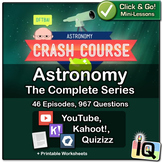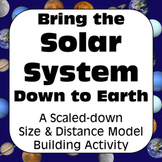240 results
Earth sciences lectures for Microsoft Word
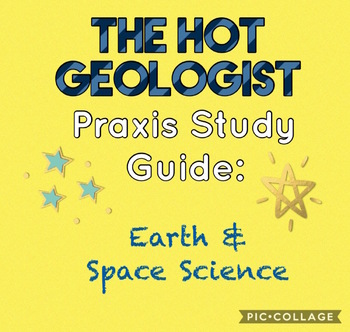
Earth Science Praxis Exam Study Guide
Need to get the extra certification to become more qualified? Say no more!
I made this study guide based on the PDF from the Praxis site: https://www.ets.org/s/praxis/pdf/5571.pdf
Includes all test specifications and sections needed to know for the exam!
> I passed for my state standards from studying this study guide I made! Good luck, studying one page a day helps!
MY STUDY TIPS:
• Study every day.
• Study a page a day, and also go back to old material to refresh.
• Pick a time of
Subjects:
Grades:
7th - 12th
Types:
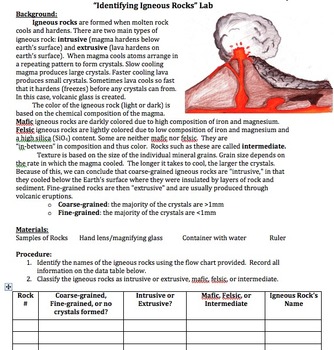
Introduction to Igneous Rock Lesson & Identifying Igneous Rocks Lab
This is an introduction to igneous rocks. Students will become familiar with the characteristics of igneous rocks and the two main types. Students will have the opportunity to practice using the characteristics of igneous rocks to identify the names of samples of Igneous rocks.
This is an all inclusive lesson. With it comes a complete formal lesson plan, differentiated handouts for various ability levels and language acquisition, student handouts of note sheets, diagram, and lab. See produ
Subjects:
Grades:
6th - 9th
Types:
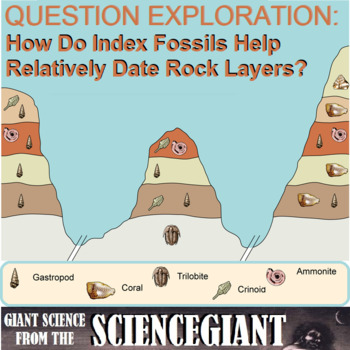
Question Exploration: How do Index Fossils Help Relative Dating of Rock Layers?
How Do Index Fossils Help Relative Dating of Rock Layers? This Question Exploration helps Ss explain index fossils and relative dating using Steno’s law of superposition, the principle of original horizontality, and the principle of lateral continuity. Question Exploration Routine is an instructional methods that teachers can use to help a diverse student population understand a body of content information by carefully answering a critical question to arrive at a main idea answer. The Concept Co
Subjects:
Grades:
6th - 10th
NGSS:
MS-ESS1-4
, HS-ESS1-6
, MS-ESS2-3
, HS-ESS2-1
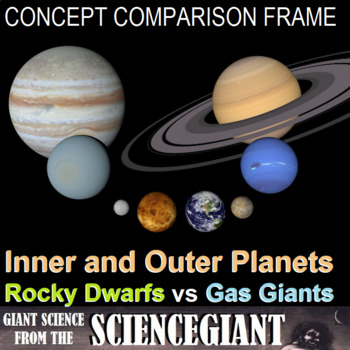
Concept Compare: The Inner and Outer Planets (rocky dwarf vs. gas giant)
How are the other planets of our solar system different from Earth? This Concept Comparison Frame helps students contrast the Inner and Outer Planets, with the terrestrial rocky dwarfs of Mercury, Venus, Earth and Mars on the one side, and jovian gas giants of Jupiter, Saturn, Uranus, and Neptune on the other. The Concept Comparison Routine is used help compare and contrast key concepts. Specifically, students use like and unlike characteristics and categories shared and not shared by two or mor
Subjects:
Grades:
6th - 12th
NGSS:
MS-ESS1-3
Also included in: StayGiant Earth Science Bundle: Astronomy (space exploration)
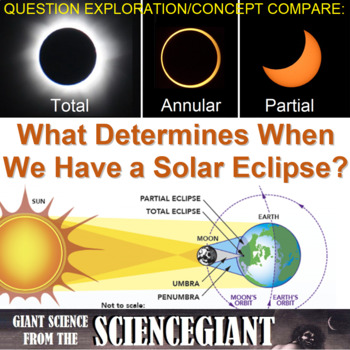
Concept Compare and Question Explore: Solar Eclipse on January 14, 2029
Why do eclipses happen? Why doesn't every new moon result in a solar eclipse? This question exploration helps students explain What determines when do we have a solar eclipse? It also includes: a concept comparison of three solar eclipses visible in the United States: a partial eclipse on Wednesday, January 26, 2028 and Sunday, January 14, 2029; an annular eclipse on Thursday, June 11, 2048; and a total solar eclipse of Wednesday, March 30, 2033 (only visible in Alaska. For the lower 48 states,
Subjects:
Grades:
7th - 10th
NGSS:
HS-ESS1-4
, MS-ESS1-1
Also included in: StayGiant Earth Science Bundle: Astronomy (space exploration)
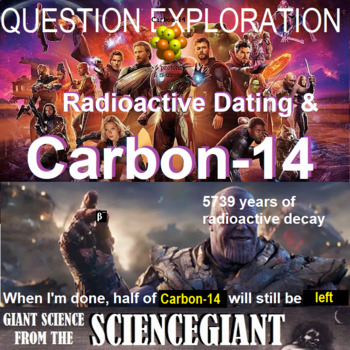
Question Exploration: What is Radioactive Dating? (carbon-14 dating)
What is radioactive dating? (such as carbon-14 dating). This Question Exploration help Ss explain half-life decay. Radioactive nuclei decay in different amounts of time based on their half-lives. Radioactive decay is the process by which a nucleus becomes stable.Question Exploration Routine is an instructional methods that teachers can use to help a diverse student population understand a body of content information by carefully answering a critical question to arrive at a main idea answer. Stud
Subjects:
Grades:
7th - 10th
NGSS:
MS-ESS1-4
, HS-ESS1-6
, HS-PS1-8
Also included in: StayGiant Earth Science Bundle: The Biosphere (biogeochemical cycles)
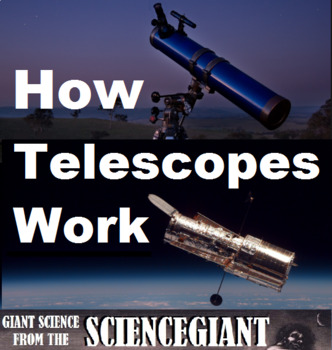
Concept Compare: Great Galileo! How Telescopes Work (refractor,reflector,radio)
What are telescopes and how do they work? This Question Exploration helps Ss explain how do different types of telescopes work. The Concept Comparison contrasts refracting, reflecting and radio telescopes. And there is a Frame reviewing the astronomical accomplishments of the first champion of telescopes -- Galileo Galilei. Magnifico!Framing Routines and Question Exploration Routines are instructional methods that teachers can use to help a diverse student population understand a body of content
Subjects:
Grades:
7th - 10th
NGSS:
HS-PS4-5
, MS-PS4-2
, HS-PS4-1
Also included in: StayGiant Physics Bundle: Optics
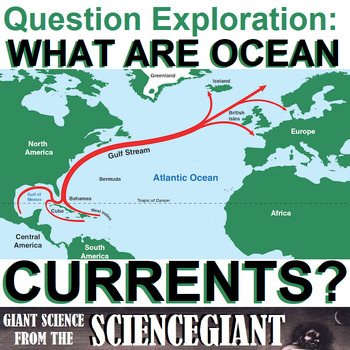
Question Exploration: What Are Ocean Currents?
What Are Ocean Currents? This Question Exploration helps Ss define currents and thermohaline circulation, explain what factors drive deep ocean and surface currents, identify the primary ocean currents. Includes 10 question quiz, and worksheet to label the currents.This product includes both the completed question exploration, and the student guide blanked except for vocabulary, scaffolding questions, and graphics already filled in. It includes a worksheet and recommended video for review. And
Subjects:
Grades:
6th - 12th
Types:
Also included in: StayGiant Earth Science Bundle: The Hydrosphere (water)
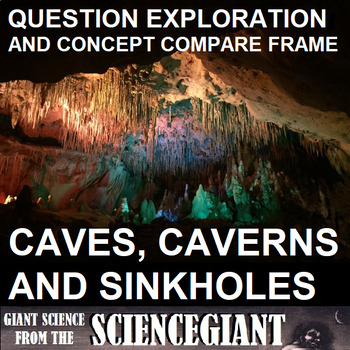
Question Explore and Concept Compare: Caves, Caverns, and Sinkholes
What causes cavities, caves, caverns, and sinkholes in karst topography? This question exploration explains landforms made by the weathering of limestone.
Question Exploration Routines are instructional methods that teachers can use to help a diverse student population understand a body of content information by carefully answering a critical question to arrive at a main idea answer. Students taught using the content enhancement routines earned higher total test scores than did students taught
Subjects:
Grades:
6th - 12th
Also included in: StayGiant Earth Science Bundle: The Hydrosphere (water)

Pelagic Zone Unit Bundle
Full bundle of pelagic zones products. Includes all notes and activities for unit:Notes: cellular energy review, energy transfer review, overview of zones, individual notes for each zone.Activities: research project, assessment project, 2 worksheets, news article with questions, movie guide. Answer keys and rubrics included where applicable.
Subjects:
Grades:
9th - 12th
Types:
NGSS:
HS-LS2-3
, HS-LS2-5
, HS-LS2-4
, HS-LS2-1
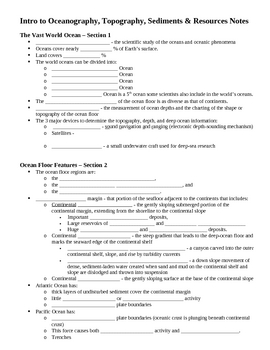
Oceanography Notes
The Oceanography notes begin by introducing the oceans, ocean floor topography, seafloor sediments, resources and then moves to salinity, marine life zones, ocean productivity then to currents, waves, tides and coastal features. Answer key included.
Subjects:
Grades:
6th - 12th
Types:
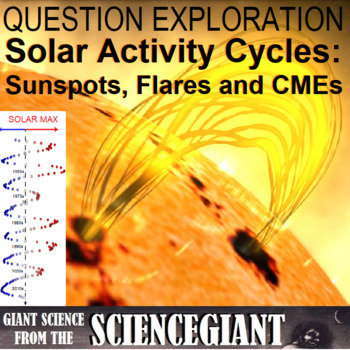
Question Exploration: What Are the Solar Activity Sunspot Cycles?
What are the solar activity sunspot cycles? Sunspots increase and decrease through an average cycle of 11 years. This Question Exploration helps Ss explain how the spotless Sun turns dark, releasing solar flares and coronal mass ejections (CMEs).Question Exploration Routine is an instructional methods that teachers can use to help a diverse student population understand a body of content information by carefully answering a critical question to arrive at a main idea answer. The Concept Comparis
Subjects:
Grades:
7th - 12th, Higher Education
Types:
NGSS:
HS-ESS1-1
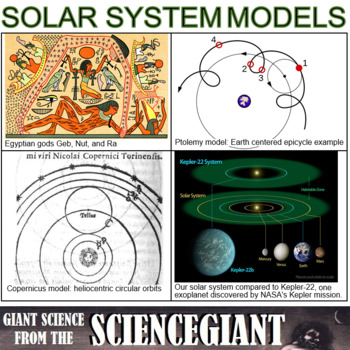
Concept Comparison and Question Exploration: Models of the Solar System
What are historical models of the solar system? This Question Exploration and Concept Comparison helps Ss contrast geocentric model painted in ancient temples, to heliocentric models photographed in modern telescopes. Question Exploration Routine is an instructional methods that teachers can use to help a diverse student population understand a body of content information by carefully answering a critical question to arrive at a main idea answer. Students taught using the question exploration r
Subjects:
Grades:
7th - 10th
NGSS:
HS-ESS1-4
, MS-PS2-4
, MS-ESS1-2
, HS-PS2-4
Also included in: StayGiant Earth Science Bundle: Astronomy (space exploration)
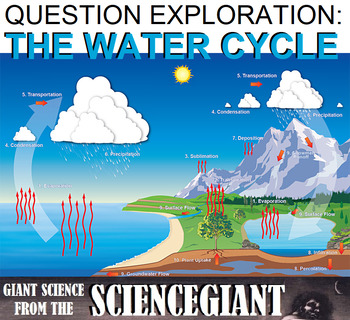
Question Exploration: What Processes Are Involved in the Water Cycle?
What Processes Are Involved in the Water Cycle? This Question Exploration helps Ss explain the water cycle -- the existence and movement of water on, in, and above the Earth. At its core, the hydrologic cycle is water (either as a liquid or solid), changing into water vapor (a gas) and back into a liquid or solid. This change of state of water as the water cycle is divided into three main parts:Moisture moving into the atmosphereMoisture moving through the atmosphereMoisture returning to the ea
Subjects:
Grades:
6th - 12th
NGSS:
HS-ESS2-5
Also included in: StayGiant Earth Science Bundle: The Atmosphere (air)
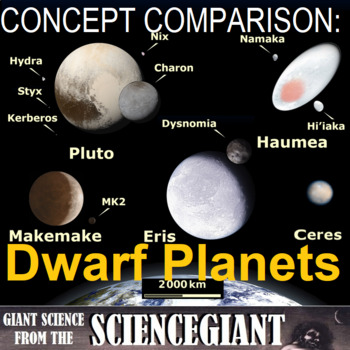
Concept Comparison: Dwarf Planets (Ceres, Pluto, Huamea, Eris, and Makemake)
This Concept Comparison Frame contrasts the dwarf planets CPHEM (Ceres, Pluto, Huamea, Eris, and Makemake). These round worlds orbit the Sun but didn't completely clear their neighborhood (one is in the asteroid belt and the rest are in the Kuiper Belt). It helps Ss explain how these rocky and icy minor planets are just as important to understanding the solar system as gas giants. The Concept Comparison Routine is used help compare and contrast key concepts. Specifically, students use like and u
Subjects:
Grades:
6th - 12th
NGSS:
HS-ESS1-4
, MS-ESS1-3
Also included in: StayGiant Earth Science Bundle: Astronomy (space exploration)
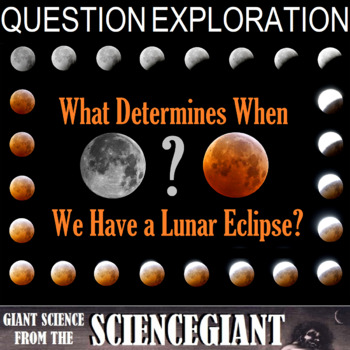
Concept Compare and Question Explore: Lunar Eclipse of 14 March 2025
Why doesn't every full moon result in a lunar eclipse? This question exploration helps Ss explain what determines when the Moon will be eclipsed, as on Friday, March 14, 2025 at 3 AM Eastern? Resource also includes a concept comparison of solar and lunar eclipses; and types of eclipses (total, partial, penumbral (lunar), and annular (solar). Actitivies and assessments for this resource include:a whole class formation activity to make a human model of a lunar eclipse, a math activity to make an u
Subjects:
Grades:
5th - 12th
NGSS:
HS-ESS1-4
, MS-ESS1-1
Also included in: StayGiant Earth Science Bundle: Astronomy (space exploration)

Pelagic Zone Notes Bundle
All the notes for pelagic zones unit - includes notes on:-cellular energy-energy transfer in ecosystems-overview of pelagic zones-notes for each of the 5 zones in detail
Subjects:
Grades:
9th - 12th
NGSS:
HS-LS2-3
, HS-LS2-5
, HS-LS2-4
, HS-LS2-1
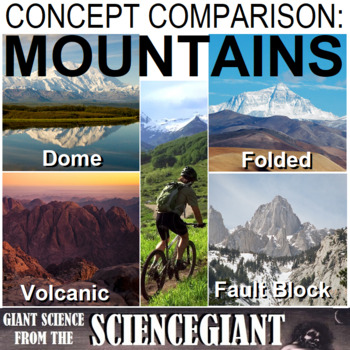
Concept Compare Frame: Mountain Types (Folded, Fault Blocked, Dome, Volcano)
This Concept Comparison helps Ss contrast four types of mountains: folded, fault blocked, dome, and volcano, and explain how mountains can form by rock layers folding, large blocks of crust being lifted during rock faulting, and by molten rock pushing up crust. The Frame Routine is a strategy designed to assist students as they organize topics, main ideas and details about reading assignments. This technique includes a basic hierarchic graphic organizer called a "Frame" that can be used to help
Subjects:
Grades:
7th - 10th
NGSS:
MS-ESS1-4
, MS-ESS2-3
, HS-ESS2-1
, MS-ESS2-2
, HS-ESS1-5
Also included in: StayGiant Earth Science Bundle: Geology (plate tectonics)
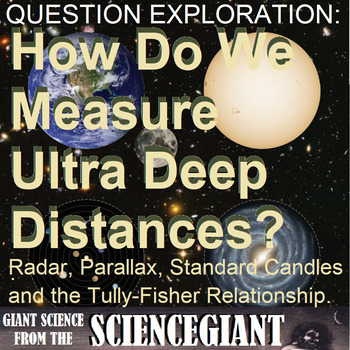
Question Explore: What Methods Measure Ultra Space Deep Distances? Parallax
This Question Exploration asks the Essential Question about cosmic distances: What Methods Do Astronomers Use to Measure Ultra Deep Space Distances? (from radar and parallax, to standard candles and Tully-Fisher Relationship used to measure distances to galaxies).Included are two activities on the scale of the universe for student assessment to be used as a warm up or after class review. The first is a classroom formation line-up, the other is a two-inch universe modeling about scale and ratios.
Subjects:
Grades:
7th - 11th, Higher Education
NGSS:
5-ESS1-1
, MS-ESS1-2
Also included in: StayGiant Earth Science Bundle: Astronomy (space exploration)
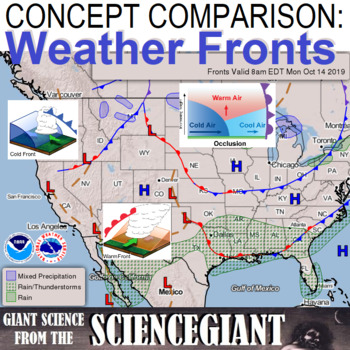
Concept Compare Frame: Weather Fronts and Air Masses
What are weather fronts? This question exploration and concept comparison frame helps Ss contrast four different types of weather fronts are, the kinds of weather they bring, and the air masses associated with them.Question Exploration Routine and Concept Comparisons are instructional methods that teachers can use to help a diverse student population understand a body of content information by carefully answering a critical question to arrive at a main idea answer. Students taught using the cont
Subjects:
Grades:
6th - 12th
NGSS:
HS-ESS3-5
, MS-ESS2-6
, MS-ESS2-5
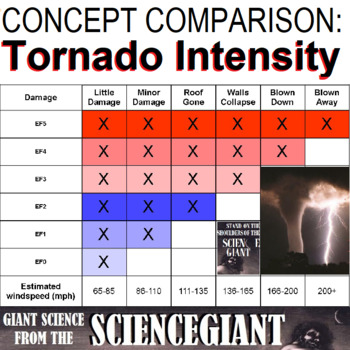
Concept Compare Frame: Tornado Intensity on the Enhanced Fujita Scale
This Concept Comparison helps Ss contrast categories of tornado intesity with Enhanced Fujita scale.Concept Comparison Routine is used help compare and contrast key concepts. Specifically, students use like and unlike characteristics and categories shared and not shared by two or more concepts to better understand the overall concept. Students taught using the Content Enhancement routines earned higher total test scores than did students taught using the lecture-discussion method. Personally, I
Subjects:
Grades:
6th - 12th
NGSS:
MS-ESS2-6
, MS-ESS2-5
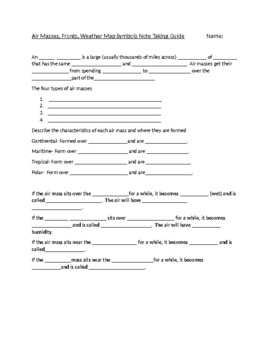
Air Masses, Fronts, and Weather Map Symbols Student Note Taking Guide
This Note-Taking Guide goes along with my Air Masses, Fronts, and Weather Map Symbols PowerPoint that has over 50 slides. If weather and climate/ meteorology is not something you know how to teach, this will cover everything they could possibly need to know. My undergraduate degree was in Geography and Weather and Climate was my area of expertise, so I really always put a lot of effort into this unit. I hope you will find it helps with your class.
Subjects:
Grades:
3rd - 12th
CCSS:
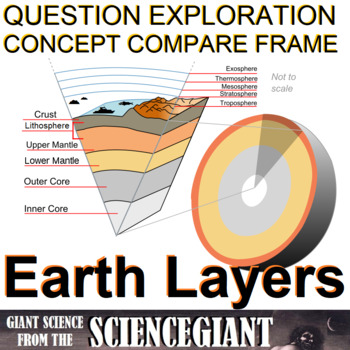
Question Exploration and Concept Compare Frame: Earth Layers
What are the main parts of the Earth? This question exploration explains about why are there different layers to the structure of the Earth, due to composition, density, temperature, and pressure. A concept comparison of Earth's interior -- the crust, the mantle, the outer core, and the inner core -- is provided. And an assessment activity with a worksheet for Ss to label and color the external and internal layers of Earth based upon the information and diagrams is included.Question Exploration
Subjects:
Grades:
6th - 12th
NGSS:
MS-ESS2-3
, HS-ESS2-3
, HS-ESS2-1
, MS-ESS2-2
, HS-ESS2-6
...
Also included in: StayGiant Earth Science Bundle: Geology (plate tectonics)
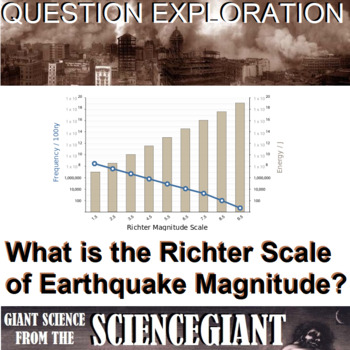
Question Explore and Concept Compare: Richter and Mercalli Scale of EQ Magnitude
What is the Richter scale for Earthquake Magnitude? This Question Exploration helps Ss explain how is the strength of earthquakes measured? It contrasts two types of earthquake moment magnitude scales: the Modified Mercalli Scale (measuring the amount of damage or shaking felt), and the Modified Richter Scale (measuring the total energy released as measured on a seismograph) Question Exploration Routines are instructional methods that teachers can use to help a diverse student population underst
Subjects:
Grades:
7th - 10th
Also included in: StayGiant Earth Science Bundle: Geology (plate tectonics)
Showing 1-24 of 240 results

